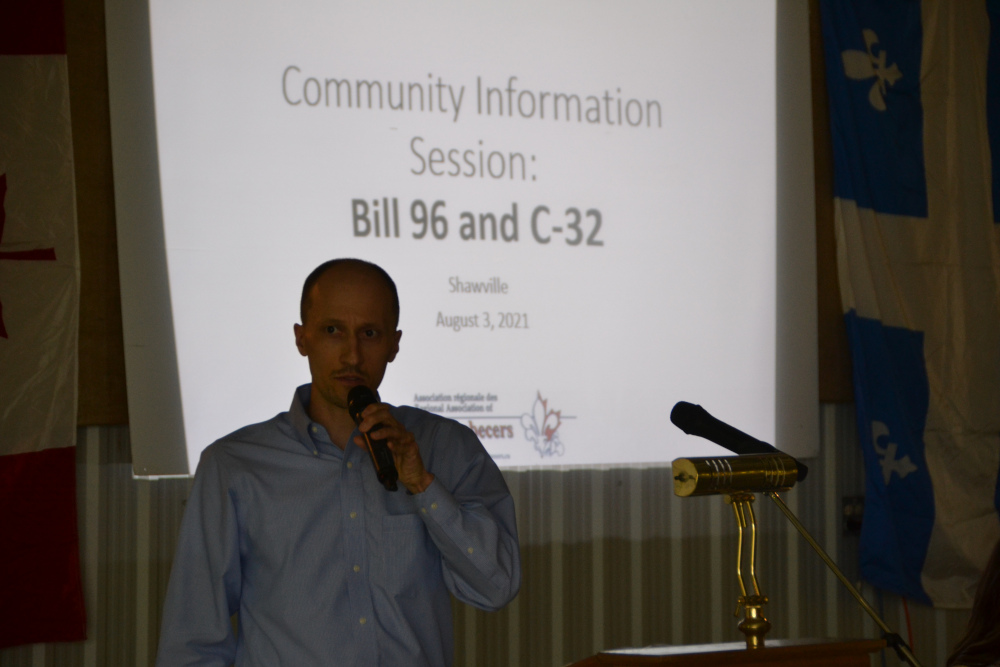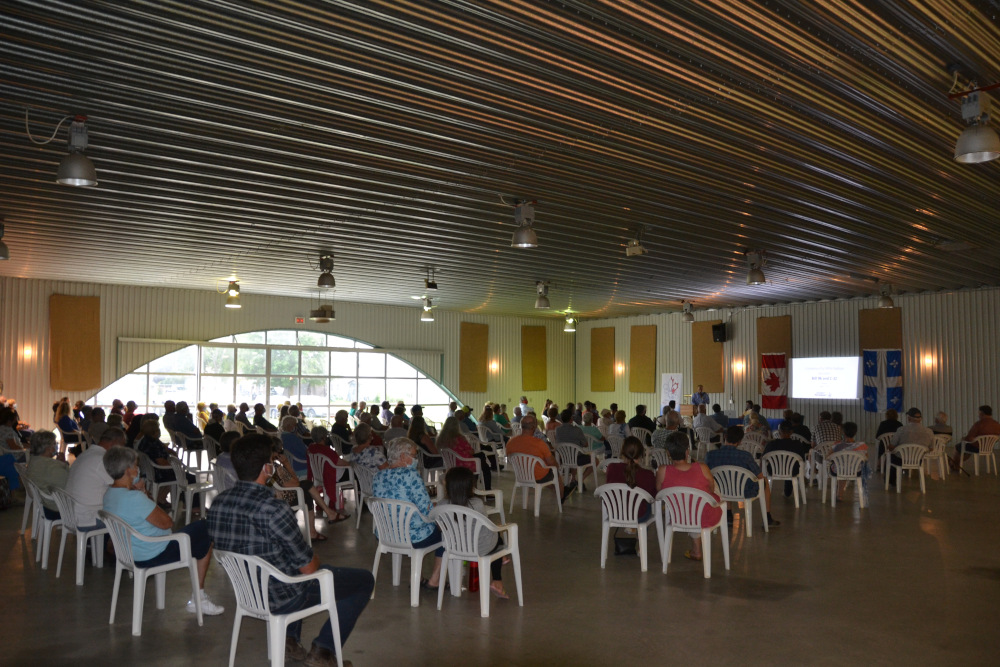Strong opposition to Bill 96 at RAWQ meeting in Shawville
Strong opposition to Bill 96 at RAWQ meeting in Shawville
A sizable crowd filled the Homecraft Hall on the Shawville Fairgrounds Tuesday night (August 3) for an information session on Bill 96, the Quebec government’s proposed update to the province’s language laws. In addition to the roughly 70 attendees in the building, more than 100 took in the event online.
The evening was put on by the Regional Association of West Quebecers (RAWQ), a not-for-profit group funded primarily by the Department of Canadian Heritage, that supports and advocates for English-speaking residents of the Outaouais. The discussion was billed as an information night on both Bill 96 and Bill C-32, the federal government’s proposed changes to the Official Languages Act, though only the former was brought up.

RAWQ President Arthur Ayers led the discussion, and he started off by acknowledging the elected officials in the room, which included Pontiac MNA André Fortin, his colleague Greg Kelley, Pontiac Warden Jane Toller, Federal Conservative Party candidate Michel Gauthier and several mayors.
He then polled the room to see how many were business owners, farmers or retired, and judging by the show of hands the overwhelming majority in the room were the latter.

Ayers gave a overview of Bill 96, highlighting the changes for businesses and municipalities as well as the constitutional implications of the government’s use of the notwithstanding clause.
Reactions from elected officials
The floor then opened to statements by the elected officials present, with Fortin taking the mic first. He said that he believed there were useful aspects to the bill, but added that he feared the bill was being used as a wedge issue to divide voters along linguistic lines.
He pointed out that the CAQ government had allocated more funds for the Office of the French Language, which would mean more inspectors on the territory to enforce existing regulations and the new rules once they become law. He said he was also concerned about the effects of capping the number of Francophone students attending English CEGEPS, and the impact it could have on local institutions and their pupils.
Toller said that MRC Pontiac council would be discussing the issue at their upcoming plenary meeting later this month, and said that in her opinion, a petition should be started to help Pontiac residents voice their opposition to the changes.
Shawville Mayor Sandra Murray questioned whether these changes would affect health care services for Anglophones, and whether the free French courses proposed in Bill 96 would be offered locally. She added that she had concerns about how the bill would affect Anglophone-majority municipalities.
“Being the Mayor of Shawville, I’m worried about the municipalities and how they’re going to deal with the government if everything is only in French,” she said. “Our municipalities should be bilingual, [not all of them are]. That’s a fact of life, but we have good employees and we’re certainly not going to get rid of them because they don’t speak French.”
Kelley, Liberal critic for Relations with English-Speaking Quebecers, said he was extremely concerned about the CAQ’s use of the notwithstanding clause. He acknowledged that since the government has an overwhelming majority, all the opposition could hope to do was seek out compromises.

“So we’re going to have to find, yes, a balance, push for a balance and try to ask this government to try and be reasonable,” he said. “It’s the least I could do. I’m the opposition, they’re going to outvote me every single time no matter what I do. But we have to at least try and come to the table and say, our community is not irrational, we’re not ‘Angryphones’ … ”
Reactions from the public
The floor was opened up to members of the audience and many participated. Several spoke about the long history of Anglophones in the area, going back to European colonization. Others pointed out that older residents have a harder time picking up new languages than younger people, and shouldn’t be punished for being unilingual.
Ken Pack, the former owner of the Giant Tiger in Shawville, questioned where the Canadian government was in the discussion, and spoke about his long, frustrating history of encounters with the language inspectors during his time running the store. He said that the new changes for enterprises with 25-49 employees, which would mandate French as the language of the workplace, would be disastrous for current store management. Pack compared the situation of English-speaking Quebecers to that of First Nations’ communities.
“Please tell me what the difference is between a Native and an English in Quebec? It’s not a lot,” he said. “We’re bending over backward for the Natives, everything they do, they get, they get, they get, and we’re sitting here as a minority and we get nothing.”
Ayers gave a short response to Pack’s comments.
“The response to that comment in terms of First Nations versus English minorities, it’s a question of numbers,” he said. “The percentage of the population that is First Nations is very small compared to English. It’s the power structure.”
Long-time Pontiac farmer and agricultural advocate Chris Judd said that the language laws are bad for both Anglophones and Francophones, as they inhibit business development and contribute to ‘brain drain’ out of Quebec for higher wages elsewhere.
“It’s just terrible, for French people too,” he said. “They’re told to protect their culture, but what the hell good will culture be if you can’t get a job, can’t make a living?”

